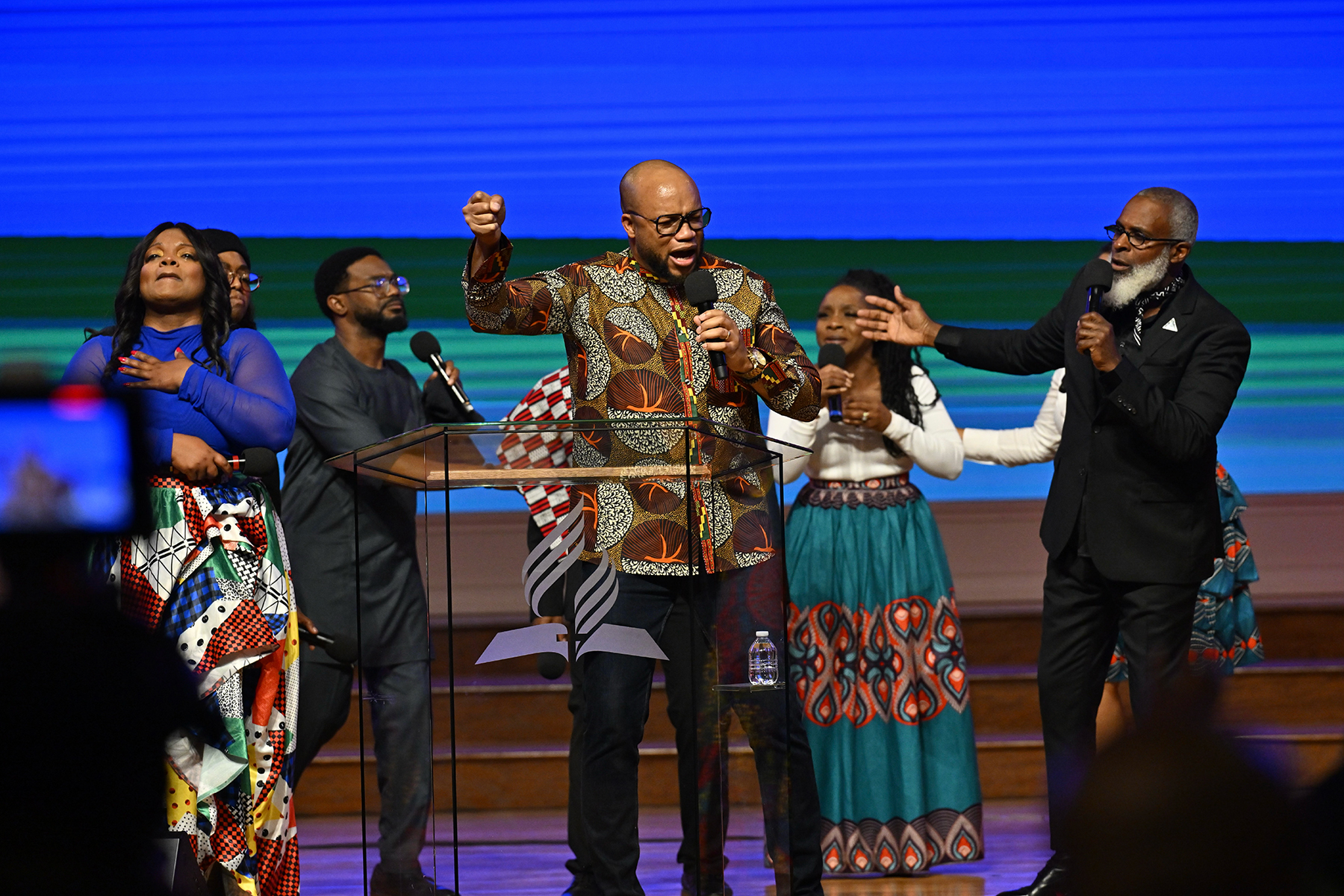
The 2023 Pastoral Evangelism and Leadership Council (PELC) marked the 10th year that Damian Chandler (pictured, middle), musician and senior pastor of Capitol City Seventh-day Adventist Church in Sacramento, California, led PELC attendees in praise and worship. Photo: Ronald Pollard
“At PELC, you just might experience spontaneous praise syndrome!” said Oakwood University Church pastor Kimberly Mann in her welcome to the 2023 Pastoral Evangelism and Leadership Council (PELC), held on the university campus in Huntsville, Alabama, on December 3-6.
As predicted, over four days, PELC attendees couldn’t help but raise their arms, stand to their feet, or shout “Amen!” and “Mercy!” in response to a deep and powerful message or spirit-filled praise song.
For the hundreds of pastors, chaplains, and other ministry leaders present, PELC offered spiritual renewal and inspiration, fellowship, and equipping. This year’s theme, “Change: Expanding minds. Engaging generations. Enhancing ministries,” was weaved into every aspect, from music to messages to seminars.
Established more than 40 years ago by regional conference leaders, PELC is the largest annual gathering of pastors and church leaders in the North American Division. The 2023 PELC was the largest in its history, with more than 800 registered attendees, most attending in person and others connecting online. It was also one of the most diverse, with participants coming from across the U.S. and Canada, Fiji, Kenya, South Africa, the U.K., and several Central American and Caribbean countries.
PELC Speakers Call for Change in Chaotic Times
“Of all the things we do here, evangelism is paramount,” stated Jesse Wilson, director of PELC and Oakwood’s Bradford Cleveland Brooks Leadership Center, on day one. He continued, “Two years ago, we added leadership to our emphasis on evangelism, but if you don’t baptize, frankly, you don’t have [anybody] to lead.” Accordingly, all programming ministered to ministers and called them to new levels of spirituality and leadership.
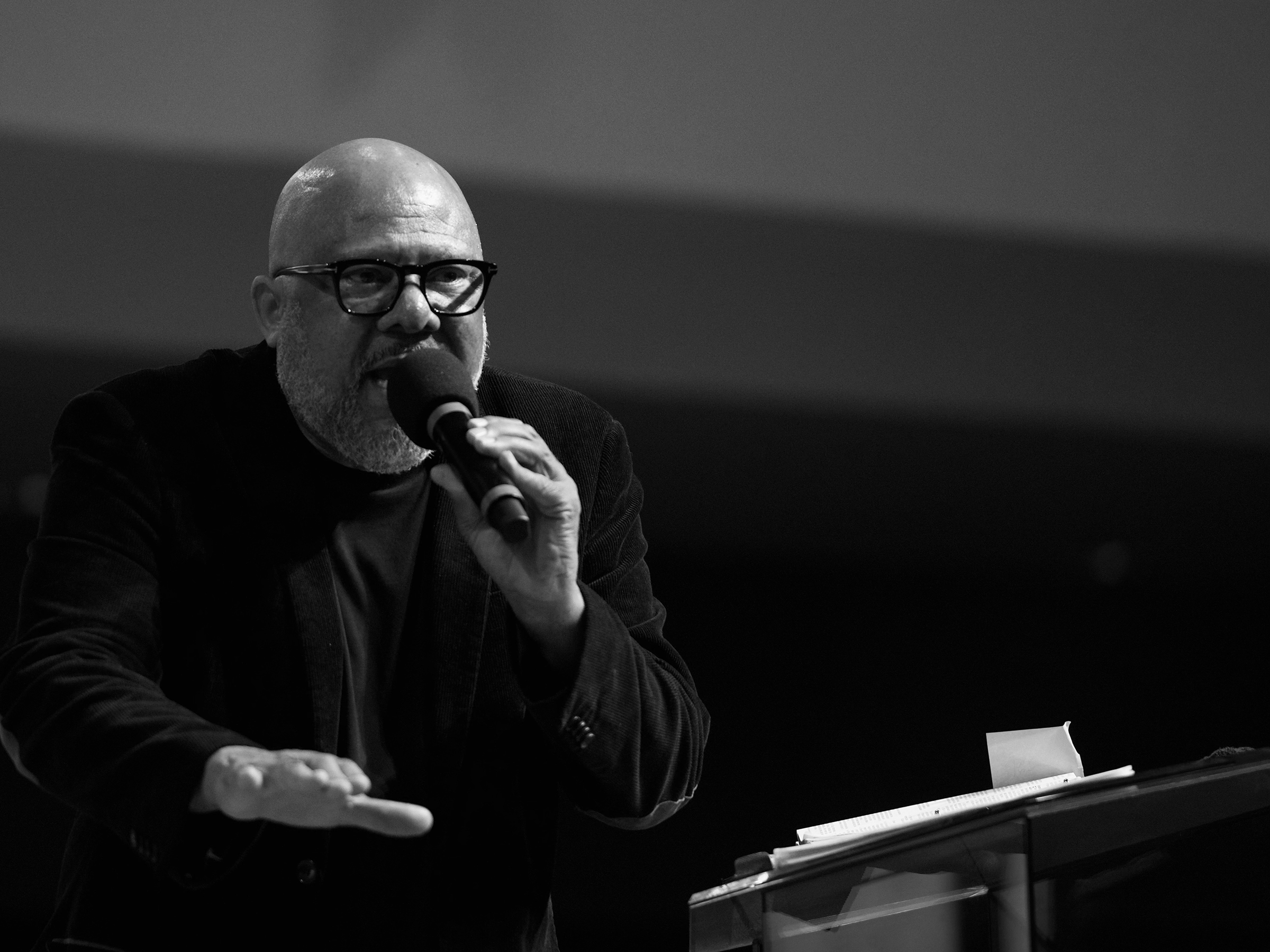
"It's just a slab!" Opening speaker James Doggette, Sr., pastor of Patmos Chapel Seventh-day Adventist Church in Apopka, Florida, urged attendees to focus on the message rather than the method. Photo: Neville Lendor, pastor, Lake Region Conference
On December 3, opening speaker James Doggette, Sr., pastor of Patmos Chapel Seventh-day Adventist Church in Apopka, Florida, coined the week’s catchphrase – “It’s just a slab."
His message, titled “The Sermon and the Slab,” referenced the setting of a foundation, or “slab” for the new temple in Jerusalem 70 years after Solomon’s temple had been destroyed. Rebuilding the slab was phase two of restoring regular worship once Israel had come out of captivity, the first being reinstituting daily sacrifices ¾ i.e., “theology before methodology.”
But many older men wept aloud amid the celebration because they felt the new slab, structured differently, and cut by the younger generation, was inferior to the previous one. “Change is hard,” Doggette acknowledged. “But for everyone who wants to be involved in transformational, visionary ministry, change is necessary,” he asserted.
His next words elicited much spontaneous praise: “Seventh-day Adventists are identified by a belief system that is biblically based. Stop conflating cultural Adventist norms with theology. A Brooks Brothers suit versus jeans and Jordans, for instance, is not theological. It’s just a slab. Fast, rhythmic music versus slow-moving hymns is not theological. It’s just a slab. A traditional sanctuary with pews versus a contemporary industrial auditorium with chairs is not theological. It’s just a slab.”
Doggette, however, asserted that he was not espousing “a cheap or bloodless grace that does not require obedience or sacrifice.” Describing himself as having a conservative theology but liberal methodology, he avowed, “While we need a new method, we don’t need a new message.”
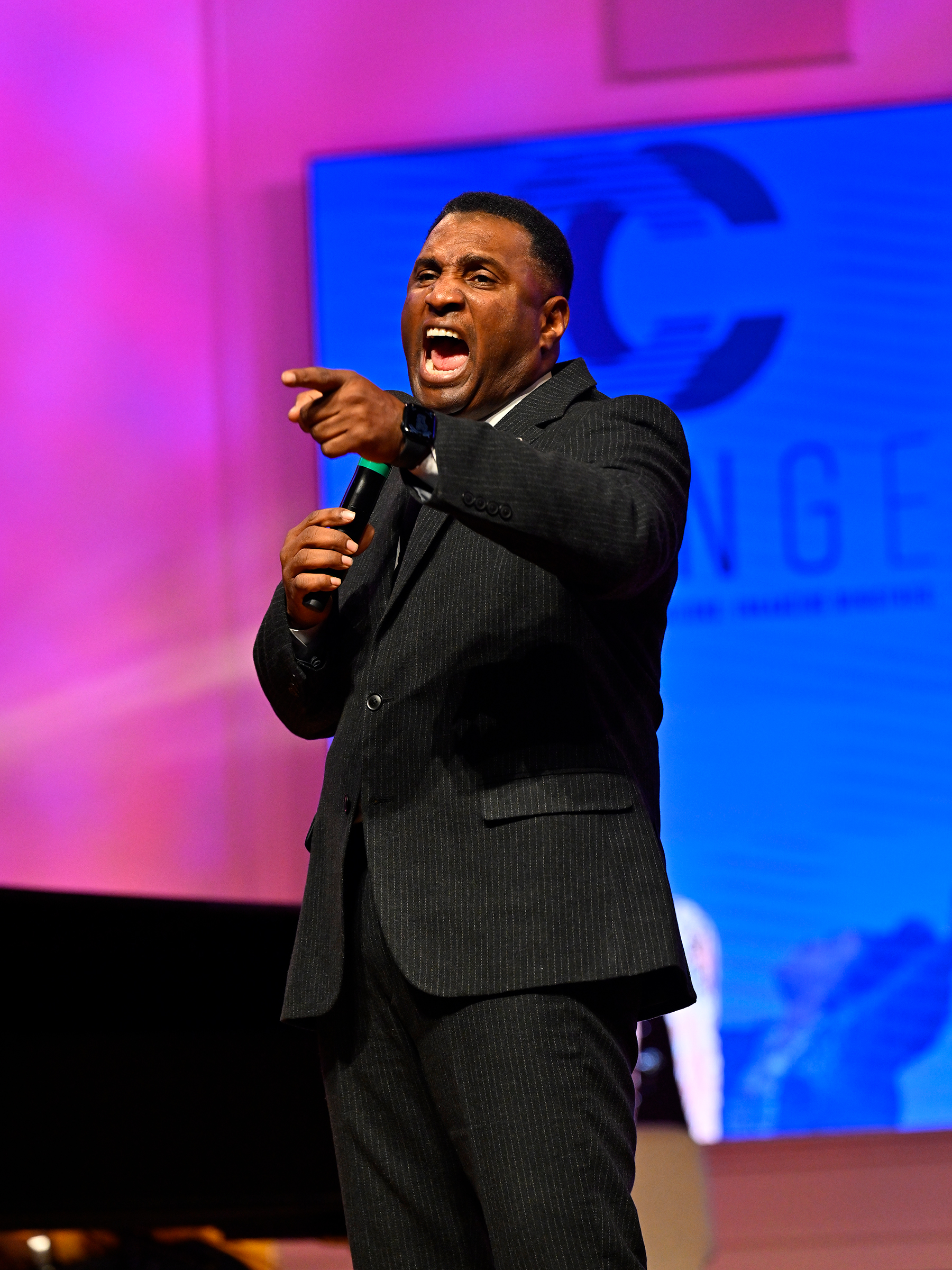
"Come out of the cave, preacher!" said Roger Bernard, president of the Central States Conference of Seventh-day Adventists, during PELC's final evening worship service. Photo: Ron Pollard - ronpollard.com
Other speakers emphasized trusting God in uncertain times and dead situations, referencing COVID-19, racial inequities, natural disasters, wars, and other end-time events. Referring to God’s provision for Elijah during a drought in 1 Kings 17, Gina Stewart, senior pastor of Christ Missionary Baptist Church, stated, “You may be in uncharted territory, the brook has dried up, [and you’re] facing unprecedented challenges. [But] the same God that took care of Elijah will take care of you.”
“The world is a mess,” said Roger Bernard, president of the Central States Conference of Seventh-day Adventists, on Tuesday night. In 1 Kings 18, Obadiah hid the preachers in a cave during a famine, and they grew useless. Bernard compared them to pastors in caves unwilling to “visit people or take calls after 9 p.m.” He didn’t mince words: “Come out of the cave, preacher! Preachers have no business in caves if they want to see change.” He concluded, “We need the presence and power of the Holy Spirit in a way we’ve never had before. When it rains, our churches will get focused. When it rains, people will grow spiritually. When it rains, Jesus will come to take His people home.”
PELC began with a self-proclaimed “senior citizen” and ended with a member of Gen Z, Max Gomez, associate pastor of Hilltop Community Worship Center Seventh-day Adventist Church. Wilson confirmed that this selection was intentional. “The whole idea of change across generations, different generations spoke, and they were heard.”
The final morning, Gomez shared that in Judges 3, Ehud, a Benjamite, is described as a left-handed man, an anomaly as “Benjamite” means son of the right hand. He used what was viewed as a weakness, his left-handedness, to help him kill Israel’s oppressor, Eglon, Moab’s overweight king. Ehud stealthily stabbed Eglon in the belly while on assignment to give him a tribute. “They had the deliverer doing deliveries,” Gomez underscored. Also, as Israel was not a fighting nation, Ehud used a double-edged sword he had created. Gomez highlighted that, among his overlooked talents, Eglon was ambidextrous, a blacksmith, and a musician.
“Look at how multifaceted Ehud’s left hand was. Ehud built with his left hand what had never been built before.” He spoke directly to the leaders present, “What would ministry look like in 2024 if we stopped limiting the dexterity of our pastors?”
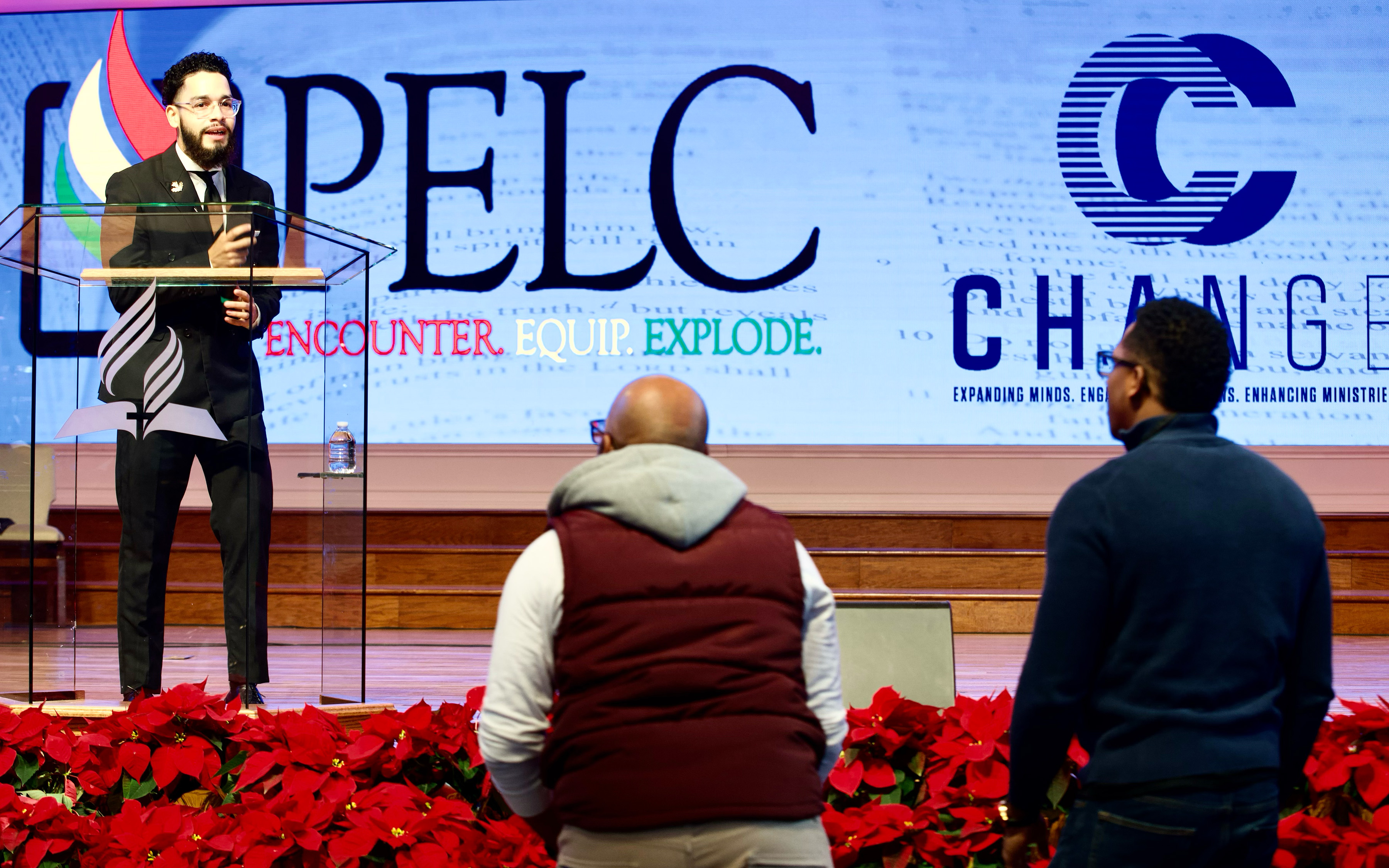
Max Gomez, associate pastor of Hilltop Community Worship Center Seventh-day Adventist Church, closed out PELC's worship services with a passionate call to use everything in your hands for the glory of God. Photo: Christelle Agboka
And to the “Ehuds” in the audience, he said, “Your left hand is your creativity and ingenuity that emerges from a place of scarcity.” He urged them to declare, “Everything God has ordained me to do, I’m going back to my church, I’m going back to my district, I’m going back to my city, and I’m gonna start using my left hand.”
“The Gathering” Music Emphasis
Notably, 2023 marked the 10th year that Damian Chandler, musician and senior pastor of Capitol City Seventh-day Adventist Church in Sacramento, California, led PELC attendees in praise and worship. His team, comprised of several returning and some new members, ministered with a chemistry and deep spirituality forged through practice and group devotionals.
The PELC praise team featured prominently in every worship service. Their music significantly enhanced the worship experience, including nightly altar calls. Attendees were also moved by exceptional musical guests including Gale Jones Murphy, Stephen Manders and Decree, Sunday’s Best winner, Melvyn Crispell III, and Stellar Award winner Lena Byrd Miles.
New this year was a conference called “The Gathering,” which showcased high-level, impactful worship music during a hymn fest on December 1 and a contemporary concert on the 2nd, including Chandler’s team. But the heart of “The Gathering” was workshops offering lessons in music, spirituality, and team building for pastors and music leaders.
“The Gathering was amazing and very insightful, including things I hadn’t thought about,” said Josiah Ruff, a professional musician and seminary student transitioning to pastoral ministry.
Equipping and Inspiring Leaders
Beyond “The Gathering,” participants gleaned insights on different aspects of ministry from expert practitioners. Pre-PELC sessions for elders and Bible instructors empowered lay members to serve amid pastoral shortages. Chaplains also had a dedicated track, affirming their calling as ministers in a pluralistic context. Their program began with a Chaplains’ Sabbath at Oakwood University Church featuring Rear Admiral (Ret.) Barry Black, United States Senate chaplain, continued with mental health-focused training sessions on the 3rd.
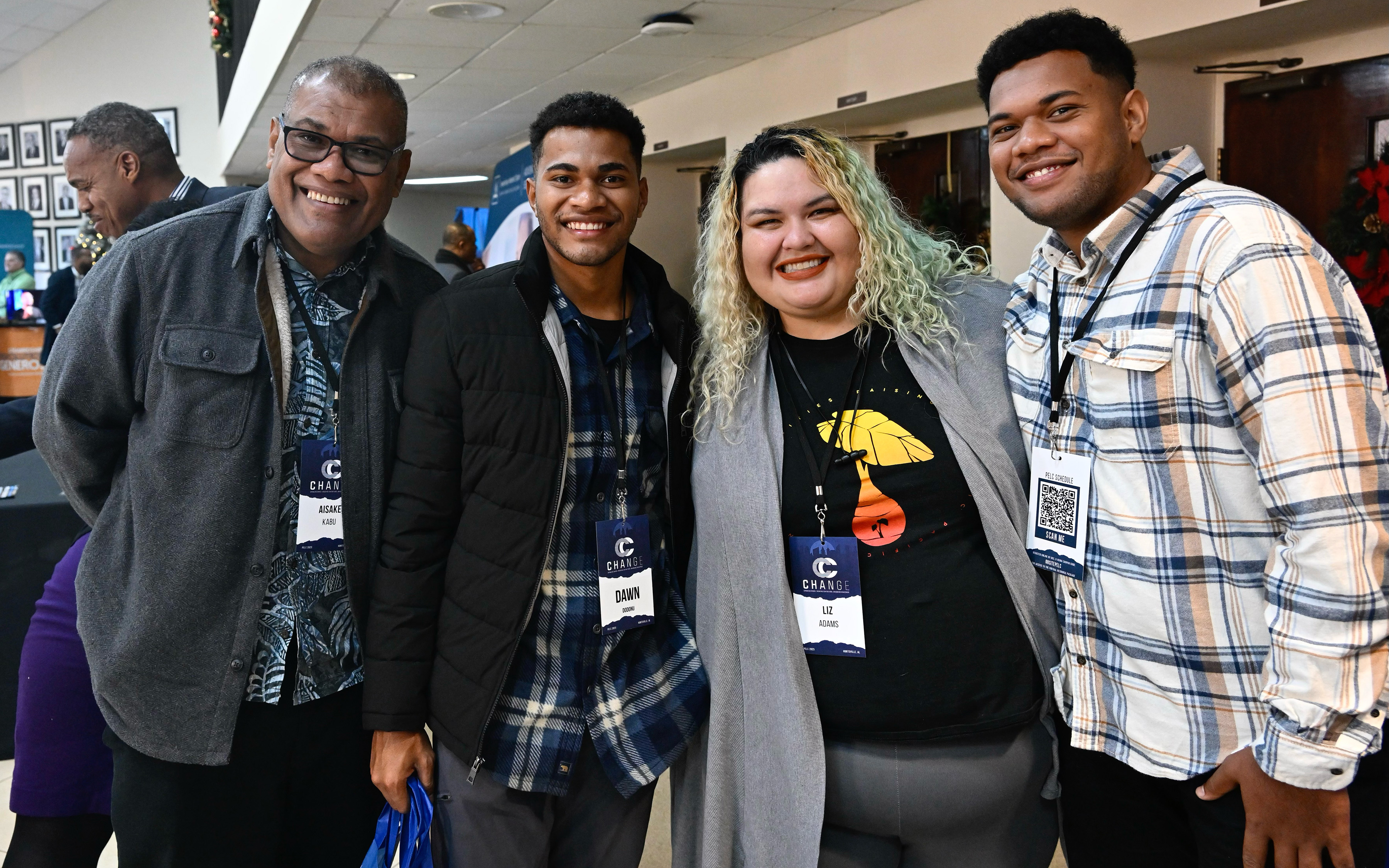
This year's PELC was the largest and most diverse in its history, with attendees hailing from across the U.S. and Canada, Fiji, Kenya, South Africa, the U.K., and several Central American and Caribbean countries. Pictured are attendees from Fiji and the U.S. Photo: Ron Pollard - ronpollard.com
Subsequent sessions, including a plenary by Fredrick Russell, principal of True North Leadership Group and former pastor, conference president, and PELC leader, on change management, emphasized surrender to God as a critical leadership principle: “When God’s hand is with you, nothing will go off track. He creates things you couldn’t create on your own.”
PELC maintained a practical focus throughout. A panel with NAD leaders Ivan L. Williams, Ministerial Association director and newly appointed vice president for strategy and leadership, and Ministerial Association associate directors Jose Cortes Jr. and Gerardo Oudri was a safe space for attendees to ask anything about ministry. On the last day, Daniel Kelly and Daniel Hall offered a boot camp on public evangelism titled “Public Evangelism Today: What’s working and what isn’t?” Other seminars included children’s evangelism, social justice and the church, your calling, sharing Adventist doctrine in fresh ways, soul-winning, the Black Hebrew movement, and inter-generational dialogue.
For several years, PELC has also included training sessions in Spanish for the division’s Hispanic leaders. Presenters this year included Jose Rojas, president of Puente Ministries and former NAD youth and volunteer missions director, Cortes, Cesar de Leon, NAD Family Ministries director, and Armando Miranda, NAD associate director of Youth and Young Adult Ministries. As at previous events, Esperanza TV provided praise and worship and audiovisual support.
The pastoral spouses, led by Linda Pennick, also had a separate gathering. Twelve years ago, PELC leaders chose Pennick for this role. Given her 53 years (and counting!) as the wife of a retired pastor and conference president and her vocational background in chaplaincy, women’s ministry, and education, the role fit like a glove.
Roughly 45 women attended the pastoral spouses’ event; notably, only one man has registered since Pennick began leading. It also followed the theme of change, as pastoral spouses face many transitions related to their spouse’s vocation. Keynote speakers included Quernande Wells, an assistant high school principal, and Beverly Sedlacek, a psychotherapist and Into HIS Rest Ministries clinical director. The biggest benefit, Pennick said, is “coming together, hearing another pastor’s spouse’s journey, and knowing you’re not alone.”
Standing on the Shoulders of Those Who Came Before Us
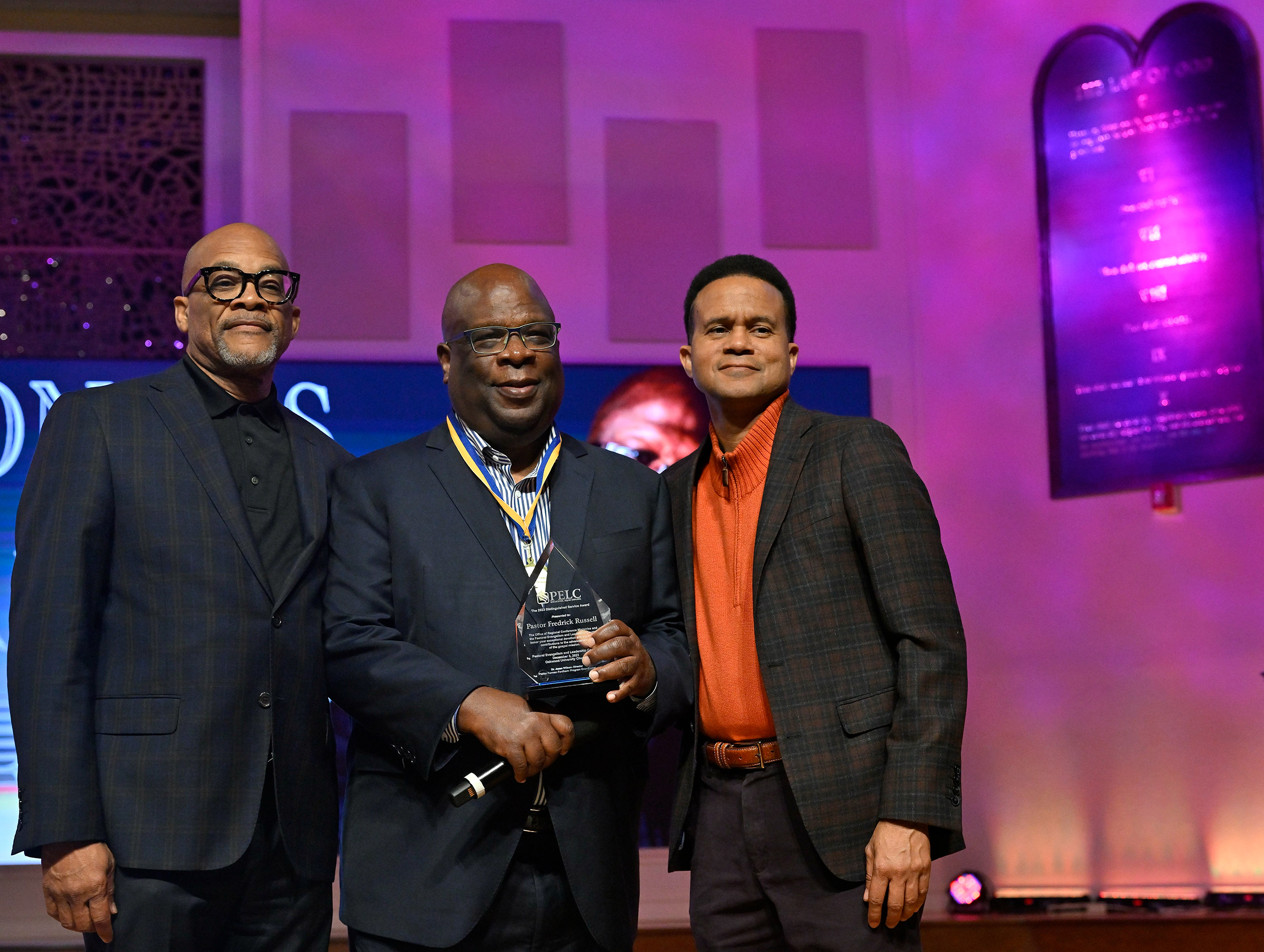
At the 2023 Pastoral Evangelism and Leadership Council (PELC), Fredrick Russell, principal of True North Leadership Group and former pastor, conference president, and PELC leader received a service award for his ministry achievements. He's pictured here (middle) with Jesse Wilson (left), director of PELC and Oakwood University's Bradford Cleveland Brooks Leadership Center, and Furman Fordham, PELC associate director and director of Church Ministries and Mission Development at the South Central Conference. Photo: Ron Pollard - www.ronpollard.com
PELC opened officially on Sunday, December 3, with a service awards program recognizing exceptional church workers. Honorees in fields ranging from pastoral ministry and evangelism to church and educational administration included Trevor and Edith Fraser, David Willis, Norman Miles, and Roy Brown. The late T. Marshall Kelly was also honored posthumously, with his children accepting his award.
Later that week, Russell was also awarded. Russell complimented Wilson on his leadership, stating, based on his travels, that “around the world, this conference is one that people are looking at as the standard. It is the most engaging, the most growing conference in the Adventist Church. It is constantly pushing the envelope for the kingdom.”
Wilson believes the Lord led the steering committee to this year’s theme “as a [reflection] of what’s going on in the nation and what’s going on in churches. It’s clear that change [to the method, not the message] is the order of the day.” He noted that change must begin with hard conversations around race, gender, and structural issues in the church.
Pleased that PELC gave voice to leaders of all generations, he craves more cross-generational conversations. “What Max said as he was closing out his message is, if you want an audience, you need to build something better. If you’re not building anything, you don’t have credibility. All of us need to build something, especially the young preachers. I think as we cross-mentor, or mentor across generational lines, and continue to build, we’ll be good.”
For more information about PELC and to access archived content, visit pelcpower.com. Click here to learn more about regional conference ministries, including PELC.
